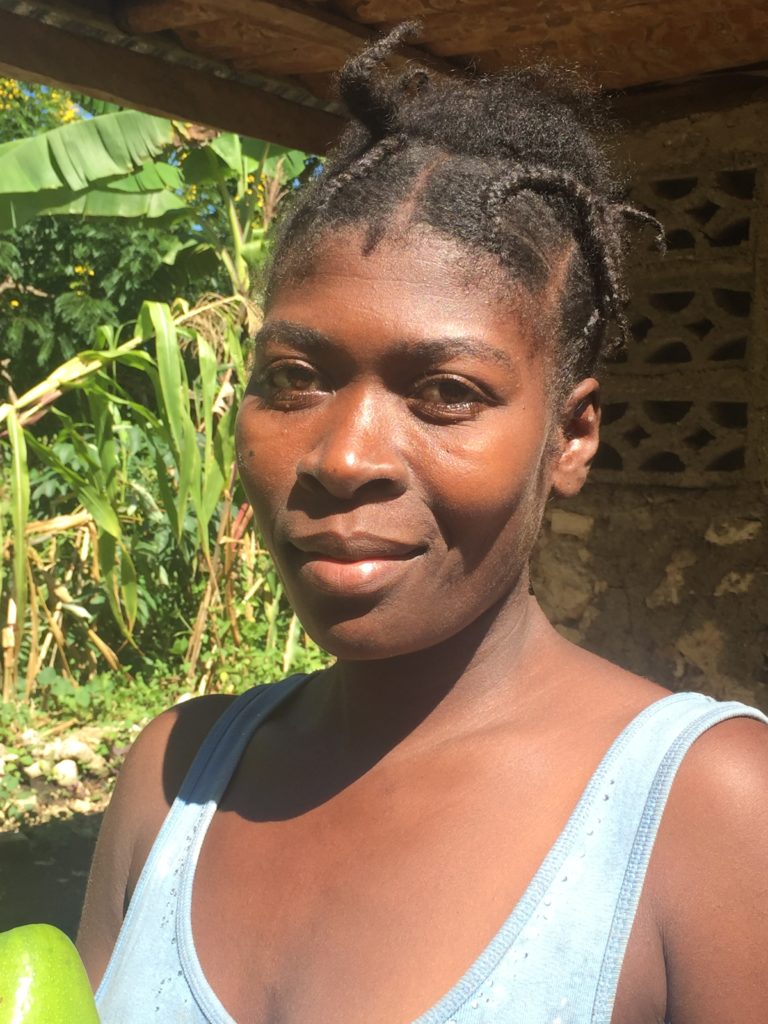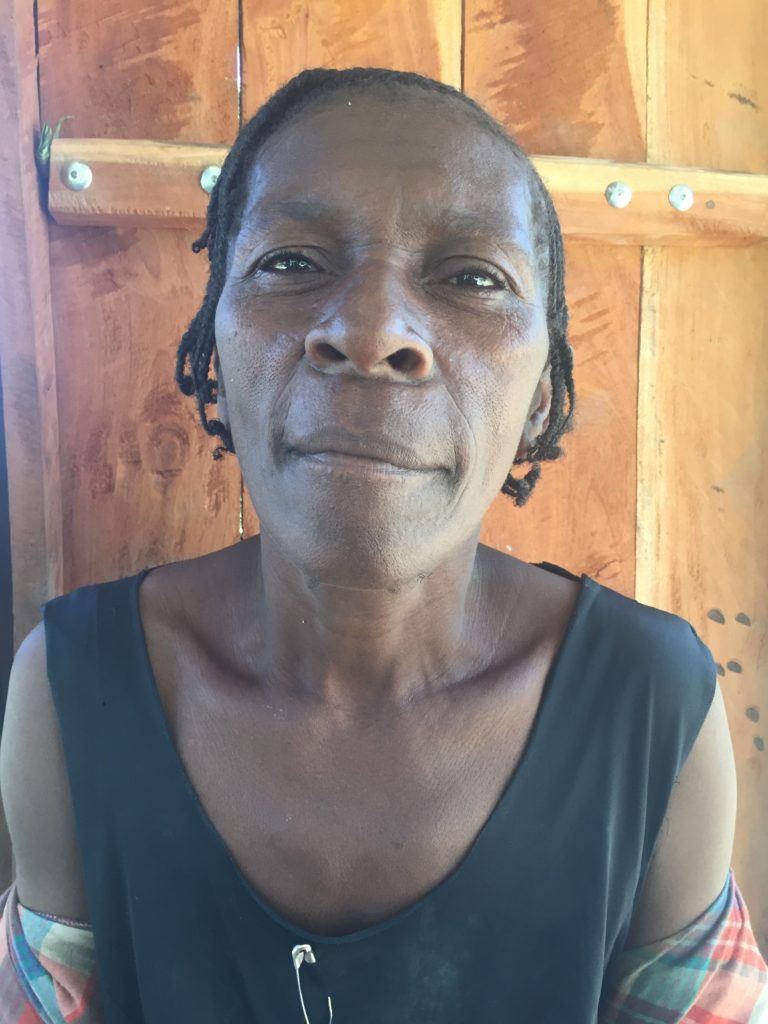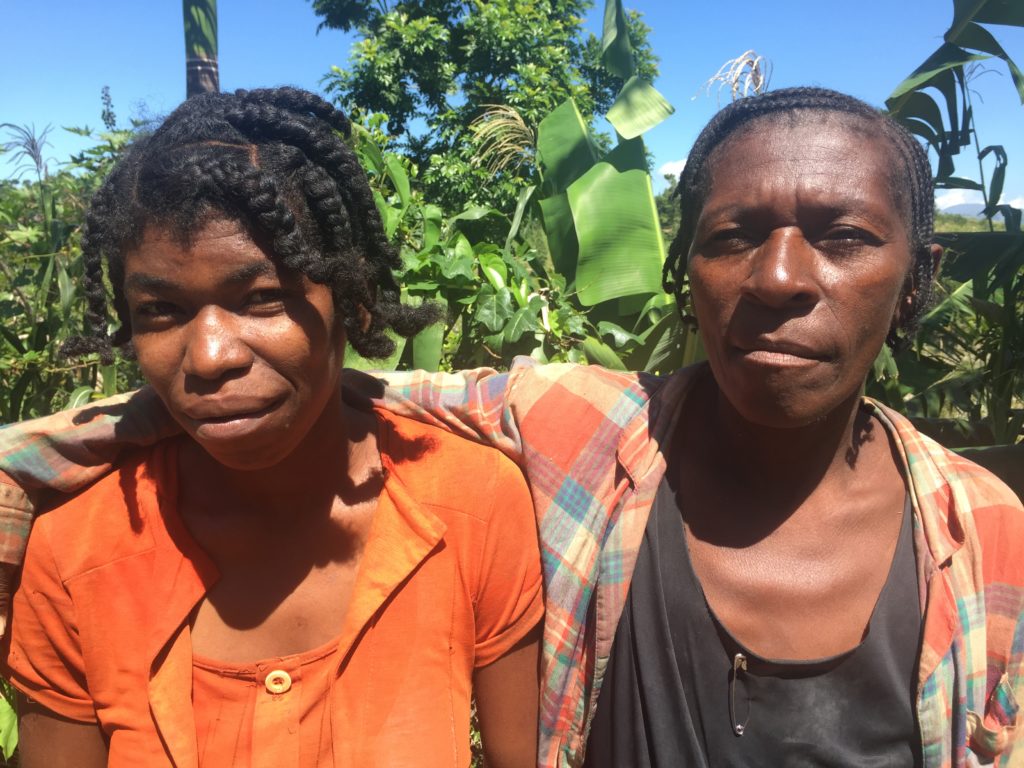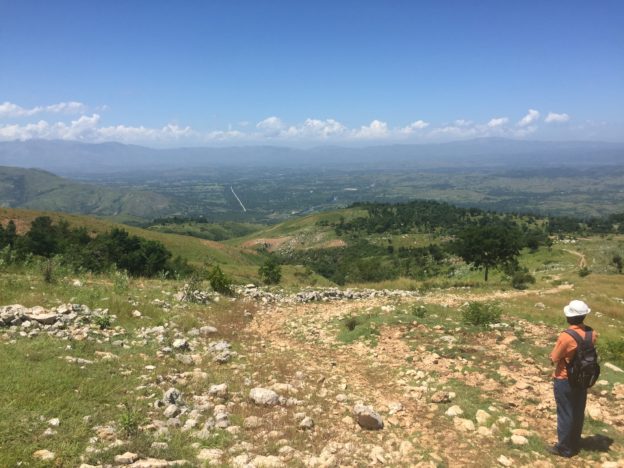Bwa Joli stretches along one of the ridges that divide Tomond from Boukankare, which lies to its south and west. It is a hard-to-reach neighborhood of small farms, mainly patches of corn and beans. The one road into the area is the steep climb up Mòn Dega. Recent work by heavy road equipment smoothed out some of the worst spots on the slope, but the work stopped in Plenn Dipò, so the last hill from there to Bwa Joli remains challenging.
Gran Chemen is a broad footpath well onto the Tomond side of the ridge. That’s where Manoucheca Louis lives with her partner and their three kids. Before the family joined the CLM program, they survived by farming, making charcoal, and selling the avocados that grow on her in-laws’ land once-a-year. “If you don’t have a horse, you have to carry your merchandise on your head, which means you can’t make much. You’re stuck selling a day’s worth of labor or making charcoal. We had reached a difficult moment.”

Manoucheca has been a CLM member for seven months. She chose goats and poultry as her two enterprises, and while the goats haven’t yet had kids, they are healthy. “I put them with a buck and thought they were pregnant, but they weren’t. I mated them again last week. So, we’ll see.”
The poultry has gotten off to a quicker start. As part of the package, she received two turkeys, and one already has three chicks. Turkeys are valuable, but they are hard to keep. They tend to wander off, and they are easy to steal. “The chicks were disappearing for days at a time, to I finally had to tie the mother to keep it in my yard.” In addition, a sharp rise in the price of local chickens has increased the value of her holdings. She plans to wait to sell off some of the chickens, though. “I’ll use the money to buy another goat, because a goat can turn into a cow. For the price of three adult females, you can by a young calf.”
But she isn’t ready to sell any livestock yet, and she’s reluctant to sell any for food. So, her husband is still responsible for the family’s income. And she needs that income, both to feed her kids and to save every week in her Village Savings and Loan Association. “If he gives me 500 gourds to go to the market, I make sure that I set aside 50 gourds or so.”
She’s getting ready to use the access to credit that her savings provide. She plans to borrow 3000 gourds this week to buy beans at the market in Opyèg. She’ll be able to sell them for a higher price by carrying them downhill to markets in more populous areas. She can buy on Wednesday, and sell on Friday in Domond. Then she’ll buy again on Saturday, and sell on Monday in Difayi. She doesn’t have an animal she can load, so she’s limited to the seven coffee-cans worth she can carry on her head, but it is a good, if a difficult way, to establish a regular income.
It is a hard time for her to begin, however. She is in the early stages of a new pregnancy. But Manoucheca is confident. “When I had my other kids, I was able to work almost until they were born.”

Marie Exantile also lives in Gran Chemen, though her home is a long way off the main path. She lives as a widow with five children and three grandchildren. Her husband has been dead for seven years.
Her oldest daughter, Zette, is also a CLM member, and she will move out of her mother’s house as soon as her own is ready. But Zette will take only her youngest child. The other two children will stay with their grandmother because the man Zette is moving in with is not their father.
Before joining the program, Marie and her children survived by farming. She would sell a day of field labor whenever she could. “Life wasn’t good. I didn’t have the strength to send my kids to school. I couldn’t keep them fed.”
She chose goats and a pig as her two enterprises. One of her goats already had a kid, and the other is growing quickly. She almost lost the kid because its mother wasn’t producing milk. But she tried a folk remedy she had heard of, and it worked, so the kid is healthy now.
Her pig was pregnant, but it wasn’t really mature enough to bring the pregnancy to full term, and miscarried the litter. It recovered well, however, and Marie still has high hopes.
Like Manoucheca, Marie thinks it is important to save money in her association, but she has to find the money on her own. She occasionally sells a bunch of plantain or whatever she can find in her garden to both buy what she and her children need and to set aside some savings. Unlike Manoucheca, she’s reluctant to take out credit. She’s been suffering from cramps in her legs for almost a year, so she has trouble getting around, and it is hard for someone where she lives to start a business without doing a lot of walking. And without a business to invest in, she is afraid that she wouldn’t be able to repay what she borrowed. So, she thinks she’ll wait until the savings and loan association pays out her savings at the end of the year and see how she’ll invest the money. “I’ll have to see how much there is.”
For the moment, not a lot has changed about her life. For six months, she received a weekly stipend, but she has no new source of income. She isn’t willing to sell any of her livestock, whether to invest in other ways or to feed her kids. “I remember once I sold two goats to plant a garden of beans, and the beans failed. My neighbors laughed. They said I was in too much of a hurry to get rich.” For now, she’ll save the livestock so she can use it if she’s faced with an emergency.

